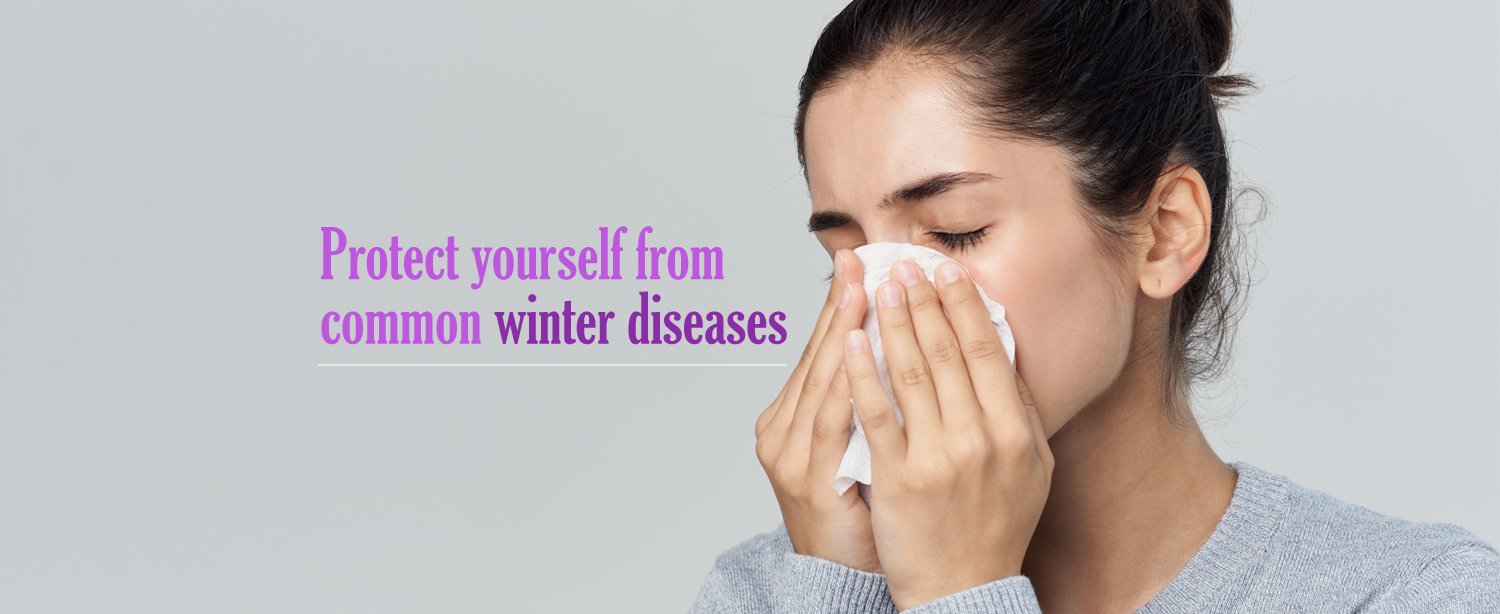Enjoying the winter chills as you sip your warm cup of masala chai? While the festive season brings a smile to many faces and gives you a chance to adorn your favourite winter jacket, it may also lead to health complications for some. People tend to get sick with changing seasons as the shift in temperature causes viruses to flourish and spread diseases. This season makes you feel sluggish and lethargic and also lowers your immunity. If you are feeling under the weather, or suffer from symptoms of wheezing or high fever do not delay in seeking medical attention.
Common Winter Diseases
Let’s take a look at some of the most common winter ailments. Take the required precautions to help prevent them:
- Common Cold
During winter, the common cold is a very frequent illness. Symptoms include runny noses, sneezing, cough, sore throat, nasal congestion and even headache. It usually goes away in a few days and doesn’t require any serious medical attention. Increase your fluid intake and rest to recover. Additionally, over-the-counter medications and nasal sprays can help alleviate the symptoms. - Influenza
Influenza or the common flu is a highly contagious disease caused by a virus. Symptoms of the flu include a fever, cough, chest congestion, muscle aches, chills, and fatigue, often developing rapidly within a few hours. Rest and self-care will help with the recovery. However, sometimes serious complications may arise in high-risk patients that include young children and adults over 65 years of age. - Strep Throat
Strep throat is a severe and painful sore throat infection that causes much discomfort. It is caused primarily by bacterial infection and is extremely common among young children. Fever, headaches, difficulty swallowing, and swollen lymph nodes in the neck are all common symptoms. Use antibiotics only if prescribed. - Bronchitis
Acute bronchitis is an inflammation of the bronchial tubes, which connect the mouth, nose, and lungs. It is more common in the winter months. Consistent cough, which may throw up mucus after a few days, is the most typical sign of bronchitis. Most patients will feel better in seven to ten days with over-the-counter medications, steam inhalation, and rest. - Pneumonia
A common infection of the lungs, Pneumonia can lead to symptoms of coughing, sneezing, and even problems in breathing. If you are suffering from breathlessness or have a prolonged cold and high fever, consult a doctor for further investigation and treatment. This lung infection is caused by a virus or bacteria that can range from mild to severe, depending on factors such as age, overall health, and the type of infection. It is more likely to affect severely to children below two years and to those over 65 years. - Acute Ear Infection
An acute ear infection is a common winter ailment in which bacteria cause inflammation and fluid build-up in the middle ear. Other causes of acute ear infections are cold, smoking, sinus infection, and changes in climatic conditions. The symptoms include severe pain, hearing loss, discomfort in the ear, etc. Consult an ENT specialist for further care. - Gastroenteritis and norovirus
Gastroenteritis and norovirus are acute stomach illnesses characterized by nausea, vomiting, and diarrhoea. They are highly contagious and are common during winters. The main sources of transmission are person-to-person contact and contaminated foods. Eat hygienically prepared food, and maintain high personal hygiene.
Winter Health Precautions
The cold weather and shorter days during the winter can make you lose the motivation to exercise and stay healthy and fit. This could lead to a weak immune system posing a greater risk of contracting the disease. Here are some precautions to stay healthy and safe this winter:
- Wash your hands frequently.
- Have more immunity-boosting foods.
- Exercise regularly.
- Drink more warm fluids during the season.
Take these precautions, stay active and eat seasonal fruits and vegetables to stay healthy this winter. It is important to seek timely medical care to manage winter ailments and lead a healthy life.


